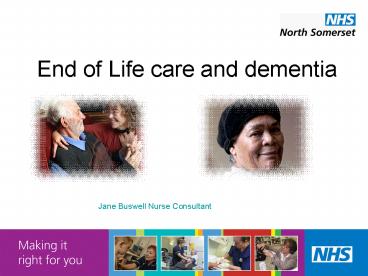End of Life care and dementia - PowerPoint PPT Presentation
1 / 16
Title:
End of Life care and dementia
Description:
End of Life care and dementia Jane Buswell Nurse Consultant A good Death Being treated as an individual, with dignity and respect Being without person and other ... – PowerPoint PPT presentation
Number of Views:610
Avg rating:3.0/5.0
Title: End of Life care and dementia
1
End of Life care and dementia
- Jane Buswell Nurse Consultant
2
A good Death
- Being treated as an individual, with dignity and
respect - Being without person and other symptoms
- Being in familiar surroundings
- Being in the company of close family and friends
- The End of Life care Strategy (DoH 2008)
3
Professional challenges
- Unwilling to discuss death and dying
- Communicating insensitively
- Not working with relatives to enable them to be
involved at the end of persons life - Difficulty with decisions about persons care
- Current services more used to dealing with sharp
decline rather than uncertain course of dementia
4
Dementia and End of Life
- 800,000 people in the UK have dementia
- One in three people over the age of 65 will end
their lives with a form of dementia - Dementia is the third most common underlying
cause of death for women in England behind heart
disease and stroke - Historically doctors have not routinely recoded
dementia on death certificates
5
Dying and dementia
- People may die from complications arising from
end stage dementia - People may being the early stages of dementia and
die from another illness - People may die from a mix of problems. Dementia
may not be the main cause of death , but it
interacts with other conditions and can
complicated
6
Location number of deaths
Care Home 15,756 63
Hospital 7,522 30
Hospices 44 Less than 1
Own home 1,439 6
Other 288 Less than 1
7
7 key issues
- Public awareness
- Care planning and proxy decision making
- Dignity
- Pain
- Withholding and withdrawing treatment
- Emotional and spiritual concerns
- Place of care and death
8
Gold Standard framework
- Provides health and social care professionals
with a structure to identify those in their last
years of their life, assess their needs symptoms
and preferences and plan care to meet these - Enables the person to live and die where they
choose
9
Gold standard framework helps the care team
provide
- Right care at right time for right person
- Care that is person and carer centred
- Care that plans ahead rather than reacts in an
emergency - Care that is closer to where the person with
dementia wants to be cared for avoids unnecessary
hospital admission - Partnership working
10
Liverpool Care Pathway
- Focuses on last days and hours of life
- Comfort measures and symptom control
- Psychological support
- Religious and spiritual support
- Communication with the person and their family
- Communication with healthcare professionals
11
Managing symptoms
- Pain
- Constipation
- Eating problems and lack of appetite
- Agitation
- Low mood
- Pressure ulcers
12
Additional complications
- No diagnosis- no advance care planning!
- Diminishing mental capacity
- Difficulty with communication
- Uncertainty in prognosis
13
Resources
- Community teams
- Weston Hospice Team
- Alzheimers Society
- National Council for Palliative Care
- NHS End of Life Care Programme
14
Unified Do Not Attempt CPR forms
- For use in all care settings across Bristol,
North Somerset and South Glos - Us only an original form with red border from the
pad
15
Peter, living with dementia says
- Death and dying should be a natural matter to
discussPalliative care for me starts, should
start, the minute you get ad diagnosis - The process of dying is quite a natural process.
- (My life until the end-Dying well with
dementia - Alzheimer's Society October 2012)
16
Key messages
- Living well with dementia also includes
supporting a person with dementia to die well, or
as they would have wished - Requires good person-centred care
- Support family and help them understand what is
happening

